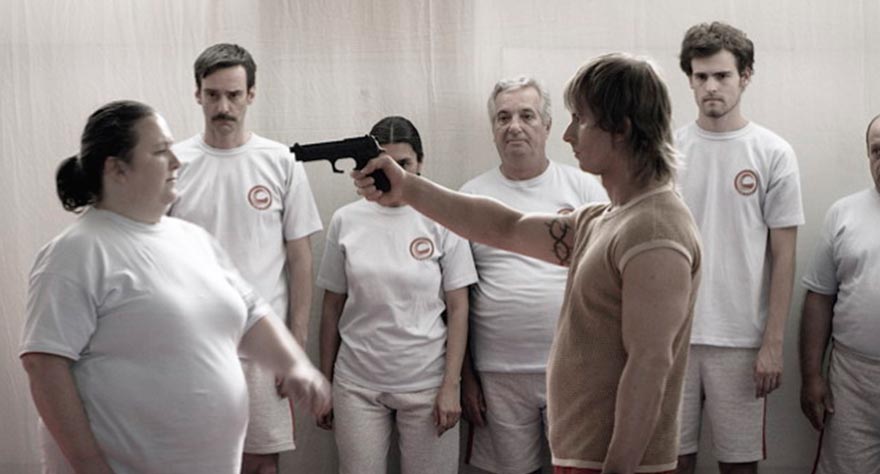
An end of the world preparation tale is dampened by arthouse tricks and a lack of action.

An end of the world preparation tale is dampened by arthouse tricks and a lack of action.
It’s the end of the world in Lukas Valenta Rinner’s Parabellum, or at least it appears that way. A lengthy opening sequence has the camera slowly panning from the sky to the ground where a comet suddenly hits down. After that unsettling opener, the film cuts to Buenos Aires, where Hernán (Pablo Seijo, a completely wordless performance) leaves his job, cancels his phone and brings his cat to a shelter. Rinner, always keeping a fair distance from the characters, slowly reveals one piece of information after another.
It turns out Hernán has joined some sort of training camp in the middle of nowhere as preparation for a doomsday scenario. Other than the opening shot and overheard news reports of violent crimes in the city, Rinner prefers to keep mum on whether or not Hernán is actually prepared or just paranoid. Joined by a group of other people from the city, Hernán begins an intensive survival training program teaching a variety of classes on topics like botany, politics and homemade explosives. The training section feels directly inspired by the likes of Giorgos Lanthimos and the Greek New Wave, with precise framing and bone dry humour (comparisons to Dogtooth and Melancholia have already been invoked by others).
But those aren’t the only influences floating around Rinner’s film, with different scenes bringing to mind arthouse favourites like Ulrich Seidl and Carlos Reygadas. The limited dialogue and location around what seems like dozens of rivers also invites comparisons to Lisandro Alonso’s Los Muertos, which followed someone around a similar area of Argentina. But while a filmmaker like Alonso knows how to create a truly mysterious and enigmatic film, Rinner feels lacking in these areas. The influences shine through, although it feels more like Rinner lifting from better sources instead of doing anything interesting with them. Long, static shots, lengthy passages of time without dialogue, and a camera that prefers to stay removed from the action are a few of the arthouse 101 tricks employed. And while Rinner certainly does a fine job—it’s quite assured for a directorial debut—the material doesn’t drum up enough interest to justify his approach.
It might be because of Rinner’s commentary on upper-class privilege, which starts taking a more prominent role the moment things take a surprisingly morbid turn in the last act. The resort itself suggests a service offered only to those who can afford the high price, and once Hernán goes through the bulk of his training, he and his classmates seem to think they can use their skills to get whatever they want. Periodic titles quoting from a fictional “Book of Disasters” subtly hint at Hernán and his classmates getting a head start on a murderous, post-apocalyptic lifestyle, but it still comes as a shock once they slaughter an entire family just to stay at their home for a few days. It’s a shock tactic that falls flat, as Rinner’s inert buildup doesn’t make the sudden shift in tone feel earned. Films keeping action at arm’s length do better when there are more ways to interpret what’s going on; when it’s applied to something more straightforward, the results can get pretty dull.
That’s a big problem in Parabellum, one that winds up dampening the large amount of potential shown in the film’s first half. What does work throughout is Roman Kasseroller’s cinematography, taking full advantage of the film’s gorgeous locale, and Dino Spiluttini’s sparse, off-kilter score. For a debut feature, Parabellum definitely establishes Rinner as someone to watch—the final shot alone guarantees I’ll keep an eye out for whatever he does next—but his film is too inconsistent and flawed to wholeheartedly recommend.